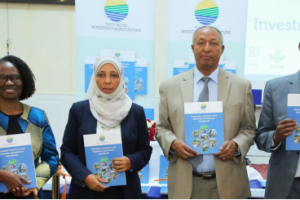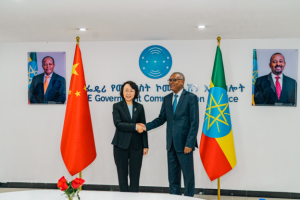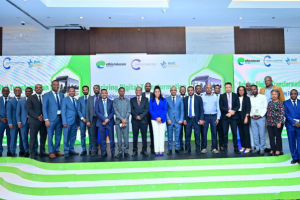
The significant forward in ranking under the 2019’s world press freedom index is the clear recognition for the remarkable progress made in Ethiopia over the last twelve months, and an inspiring power to redouble government’s effort and renew its commitment to build a democratic nation, officials and journalists asserted.
From May 1-3, thousands of journalists, media assistants, officials and other pertinent stakeholders gathered here in African Union Head Quarter to celebrate and evaluate the fundamental principles of press freedom around the world, and to pay tribute to journalists who lost their life in the exercise of their profession.
On May 2 morning session, President Sahlework Zewdie started making a speech on the podium by asking everyone what they feel when their country falls at the bottom of press freedom index.
In this regard, President Sahlework said that obviously, our record of accomplishment of the past was far from re-assuring freedom of expression as enshrined in the constitution; that is the reason why the country ranked at the bottom of the world press freedom index.
Explaining various reform measures taken over the last twelve months, President Sahlework said that the one that expands freedoms, particularly in ensuring the right to freedom of expression, is among the major steps taken to make significant
improvement over the past one year.
Of these, the release of journalists and activists in detention, the lifting of ban in some media outlets, the revision over some inhibiting laws and regulations, and the media landscape in Ethiopia has shown dramatic transformation, she stressed out.
Indeed, because of these reform measures, today there are no journalists behind bars; Ethiopia has made a significant leap forward in its ranking in the 2019’s world press freedom index, President Sahlework asserted.
According to her, the theme of this year’s world press freedom day is indeed very relevant and timely for Ethiopia, as we geared up to organize national election next year.
“This certainly encourages us to redouble our effort and renew our commitment to democratic and media reforms into the promotion and protection of human rights and freedom of expression in Ethiopia.”
Regarding this, Tsedale Lema, Editor-in-Chief of Addis Standard Magazine, says becoming free after 28 years, a strong and vibrant media is non-existent in today’s Ethiopia. With that, the country entered the new era in the last one year with the government of Abiy Ahmed as he publicly pledged that the 2009 media law will be amended.
“The media both the private and the state-owned would like to be free. We will no longer be jailed for
what we write or broadcast. Most importantly, we will be needed in the making of the journey to a democratic Ethiopia. The government needs us to stand on its side in the fight against corruption, and holding it to be accountable when failures observed. These promises are not simple promises,” Tsedale says.
President Sahlework, in this case, says that media plays an important role in facilitating political discourses, and enhancing the public understanding between the political platforms and the contesting parties.
As to Tsedale, state-owned media funded by public finances dominated and continue dominating the media space which would not bear fruit for cultivating independent and vibrant media that the country needs.
As the result of complex dynamics such as demotivated human resources, lack of public respect for the profession and the creeping media law could not support the principles of press freedom at all, she insisted.
“In fact, having a government admit to the values of independent media and commit to its growth in such a manner is a historic moment we cherished. However, many of us failed to see the writings on the wall.”
Despite having massive media infrastructure including finance and media resources, change within the powerful state-owned and affiliated media establishment both at federal and regional level is also minimal. Many of them remained to be influenced by boardroom members and editors whose primarily loyalties is pre-politics than media ethics, Tsedale evoked.
Nadia Khiari, Press Cartoonist and Creator of Willis from Tunis, I am very proud of Ethiopia, which should be a model showing up resilience.
“Today, the challenges are immense since there are horrible and tragic attacks of journalists by censorship, displacement, and other environmental issues. Along with militarization, journalists are the first victim in the fragile situation,” Nadia reflects.
Asked why journalists are targeted while exercising their profession, Former director of the School of Journalism and Mass Communication at the University of Nairobi, Wambui Kiai, says that journalists are targeted because of different interests because they operate in the public sphere.
As to Wambui, when journalists operate in the public sphere, they often see the political players want to have their way or push their agenda put forward; in this case, if the journalists start defending in this sphere, they will be targeted.
Beyond the political sphere, currently peoples began to talk about different consequences regarding justice meanwhile journalists must be looking for accountability, being watchdog, and trying to make sense in the public sphere. In doing so, journalists are bound to be offended, Wambui explained.
Jeremy Hunt, Secretary of State for Foreign and Commonwealth Affairs in United Kingdom, says the British government takes practical steps to help media professionals improve their skills here in Ethiopia providing trainings in the Embassy by international experts for the last two years.
“The UK plays its part for media freedom to legally protect journalists while doing their jobs and to promote a free media, he said adding that, journalists must follow the footsteps of many brave African writers, thinkers and journalists who fight for freedom of press exposing self for personal risk.”
Jeremy Hunt also quoted the greater freedom fighter Nelson Mandella, on a free press, that a critical, independent and investigative press is the lifeblood of any democracy. The press must be free from state interference, and must have sufficient independence from vested interests to be bold and inquiring without fear or favor, he suggested.
The media reform made over the last year symbolizes the start of a brighter future for press freedom in Ethiopia. The ongoing reform measures coupled with the terminating the inhibiting media regulations as well as improving the internal working environments of media institutions will be left as an assignment for the next year to push the ranking more forward to the top list.
The Ethiopian Herald May 04/ 2011
BY ZELALEM GIRMA





